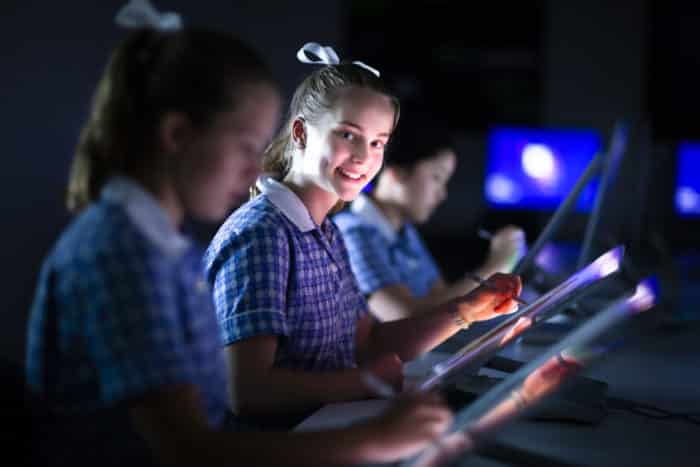In our Wellbeing program for Year 7 students in Term 3, we focused on kindness – a frequently forgotten mode of connection that benefits both the giver and the receiver (Dixon, 2011). As we have moved into the virtual version of school and friendships, and we are emphasising self-care within our days in lockdown, it is also important to remember the value of gratitude and kindness in this time; and so, we are also exploring CyberKindness.
Certified by the eSafety Commissioner, Project Rockit is a company, established in 2006, that has been working towards proactive strategies to keep students positive and safe online. Project Rockit visited students as an online incursion to support this concept of CyberKindness through encouraging respectful behaviours, inclusion, social leadership, empathy and acknowledging diversity. They engage students with young speakers, interactive and fun activities as well as suggestions of practical applications for safe skills in digital use, such as understanding privacy settings and how to report inappropriate activity.
It is difficult to imagine that any of our students could possibly experience or be instigators of cyberbullying activities, however the eSafety Commissioner reported 1 in 5 Australian students are being cyberbullied through acts such as hurtful messages or images, imitation, exclusion, humiliation or gossip. As we move through a time of isolation and impacted social connection, Qingyi et al (2020) highlight in their article Risk Factors of Cyberbullying Perpetration Among School-Aged Children, that “with certain peer and solitary activities [there is an] increased likelihood of cyberbullying behaviours.” As such, we need to be proactive in bolstering positive social behaviours and developing practical strategies that our students can readily apply.
Project Rockit have demonstrated success in reaching and shifting behaviours in young people, with 89% of participating students believing their involvement in Project Rockit has sparked positive changes for them, and a similar number noticing positive changes in their peers after participating in their workshops (Project Rockit, 2021). Of course, a single workshop is simply a catalyst for these changes, and it is realistically a collaboration of peer support, parental guidance and educational programming that will assist in developing these positive behaviours further. Tips from the eSafety Commissioner suggest that promoting respectful relationships, empathy and kindness among practical strategies, are effective ways of encouraging students to prevent cyberbullying. Project Rockit also share scenario-based advice that helps students to be confident in their responses should such instances occur.
Kindness and gratitude have been widely researched and supported through governmental and independent sources, demonstrating physiological benefits such as improved sleep and health, economic benefits such as increased productivity or minimised healthcare costs, and mental benefits such as increased motivation and happiness (Jackowska et al., 2016). In an attempt to maintain the health and happiness of our students at this time, we hope through this incursion and ongoing support from parents and teachers, that our students will continue to be both kind, and CyberKind.
Tips for students from Project Rockit:
Always ask for consent to share material of others
Block, mute, screenshot or report offenders
Be an upstander not a bystander
Enable strong privacy settings
Tips for parents from the Royal Children’s Hospital:
Set limits on time and content
Ensure adequate privacy settings are enabled
Supervise on appropriate use and content
Useful Links for Parents:
Project Rockit: https://www.projectrockit.com.au/what-we-do/
Reporting Cyberbullying: https://www.esafety.gov.au/report/cyberbullying
Practicing Empathy at home with the Resilience Project: https://theresilienceproject.com.au/at-home/everyone/empathy/teenagers/
How to be an upstander not a bystander: https://www.esafety.gov.au/young-people/be-an-upstander-not-a-bystander
Ms Liesl Woods, Year 7 Coordinator
References
Cyberbullying. (2021). Retrieved 26 August 2021, from https://www.esafety.gov.au/key-issues/cyberbullying
Dixon, A. (2011). Kindness Makes You Happy… and Happiness Makes You Kind. Retrieved 26 August 2021, from https://greatergood.berkeley.edu/article/item/kindness_makes_you_happy_and_happiness_makes_you_kind
Jackowska, M., Brown, J., Ronaldson, A., & Steptoe, A. (2016). The impact of a brief gratitude intervention on subjective well-being, biology and sleep. Journal of Health Psychology, 21, 2207 – 2217.
Li, Q., Luo, Y., Hao, Z. et al. Risk Factors of Cyberbullying Perpetration Among School-Aged Children Across 41 Countries: a Perspective of Routine Activity Theory. Int Journal of Bullying Prevention 3, 168–180 (2021). https://www.stoppestennu.nl/sites/default/files/uploads/_risk_factors_of_cyberbullying_perpetration_among_school-aged_children_across_41_countries-_a_perspective_of_routine_activity_theory.pdf
PROJECT ROCKIT’s Impact Survey Report – PROJECT ROCKIT. (2021). Retrieved 26 August 2021, from https://www.projectrockit.com.au
Rhodes, A. (2017). Screen time and kids: What’s happening in our home? [PDF Report]. Melbourne: Royal Children’s Hospital. Retrieved from https://www.rchpoll.org.au/wp-content/uploads/2017/06/ACHP-Poll7_Detailed-Report-June21.


